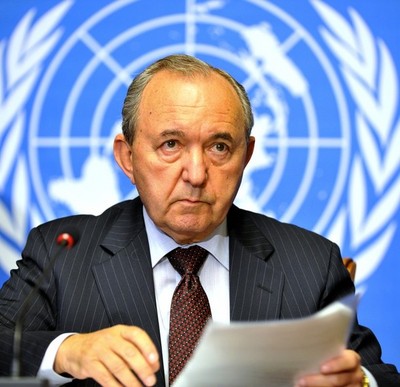
Jon Weinberg is a research intern at the New America Foundation/Middle East Task Force.
The UN fact-finding mission investigating human rights and humanitarian law violations during Israel’s December 2008-January 2009 incursion into Gaza has finally published its long-awaited report.
As expected, the Israeli government – which refused to cooperate with the mission from the outset – has reflexively lashed out against the UN, the Human Rights Council, and the mission’s head, Justice Richard Goldstone. Israeli officials cite the Human Rights Council’s lack of response to Hamas’ firing rockets indiscriminately at Israeli targets since 2002, as well as the Council’s history of focusing on Israel while ignoring other countries with similar or worse human rights records.
The report has generally received a more welcoming reception among Palestinians, but Hamas has also expressed criticism, complaining that it does not adequately distinguish between the victim and the aggressor.
Goldstone has handled himself admirably amidst the intense media firestorm. This isn’t terribly surprising considering that he has served as chief prosecutor for war-crime tribunals on Rwanda and the former Yugoslavia. Suffice it to say that he knows what he’s talking about. In both his interview last night with PBS’ Gwen Iffel and his op-ed in today’s New York Times, Goldstone consistently emphasized that both Israel and Hamas could have eliminated the need for the investigation if either side (or both) provided the international community with a more credible self-assessment.
Nine Israeli human rights organization agree with this observation, and published a letter on Tuesday in which they declare that they “believe that the State of Israel must conduct an independent and impartial investigation into these suspicions and to cooperate with an international monitoring mechanism that would guarantee both the independence of that investigation and the implementation of its conclusions.”
Neither Hamas nor, more importantly, Israel has taken this suggestion to heart. Gideon Levy hit the nail on the head in his incredibly well-written article from today’s Haaretz: “So far they have focused on the messengers, not their messages: the researcher for Human Rights Watch collects Nazi memorabilia, Breaking the Silence is a business and Amnesty International is anti-Semitic. All cheap propaganda.”
Nonetheless, not all of Israel’s defensive arguments are, like these accusations, cheap propaganda. Currently, Israel’s most persuasive arguments against the legitimacy of the mission’s findings rest on comparing Israel to the rest of the world: no other country would tolerate cross-border rocket attacks on civilian areas; no other country would cooperate with an investigation that could tarnish its reputation or incriminate its leaders; America would never allow such a mission on Iraq or Afghanistan; other countries have better security and could never fully appreciate the motivation behind Israel’s actions in Gaza; and the list goes on.
To some extent these arguments are convincing. They allow us non-Israelis to empathize with Israel’s truly ominous security situation – to better understand decisions that are made under conditions of constant existential threat. What these arguments do not do, however, is to render a justification for planning “collective punishment,” for prioritizing damaging infrastructure over seeking out individual militants, and for denying the unnecessary use of weapons containing tungsten and white phosphorous in urban areas.
Sure, other countries also do terrible things. Yes, Israel’s security challenges are far more serious than those of nearly every other developed country. And of course, within living memory, many countries have committed atrocities far, far worse than anything Israel did last winter in Gaza.
This is not a question of whether Israel is a democracy: It is. Nor is it a question of whether Israel must defend itself: It must. Nor is this a question of whether Hamas fights fairly: It doesn’t. Rather, this is a question of whether Israel, an economically developed democracy, fights fairly. If Israel truly wishes to prove its moral exceptionality, it should stop comparing its own mistakes to those of others and stop questioning the legitimacy of those who question Israel’s accountability.
— Jon Weinberg


53 comments on “Guest Post by Jon Weinberg: The Goldstone Report”